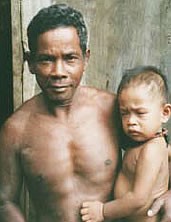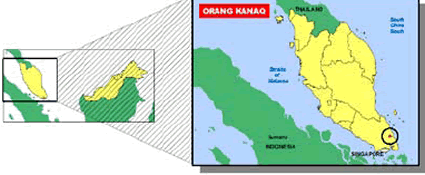The Orang Kanaq are one of the nineteen Orang Asli people groups living in Peninsular Malaysia. They come under the Aboriginal Malay (known officially as Proto-Malay) subgroup. Originally from Pulau Sekanak in the Riau Islands of Indonesia, they were forcefully removed from their homeland when the Johor Sultanate needed to supplement its forest-collection labor force during mid-19th century.
They are the smallest ethnic group among the entire Malaysian population and also the smallest of all Orang Asli tribes. They are considered one of the country's earliest inhabitants though they have been living on the Peninsula for only about 200 years. A small settlement is located in a village called Selangi in the state of Johor.
In the past, they were slave-workers tapping trees in the rubber plantations. Today, they lag behind in modern technology and education. They are still working as hard laborers in shrub and rubber plantations. In addition, the Orang Kanaq gather forest produce (such as rattan and fruits). They also fish in the rivers and hunt small animals in the forest with arrows and blowpipes.
The Orang Kanaq in Selangi live in standard Orang Asli wooden stilt houses—a small version of a rural Malay house—developed by the Department of Aboriginal Affairs for all the Orang Asli. Prefabricated from wooden timbers and planks, the house is a rectangular structure on short posts with a veranda at the front, one or two living or sleeping rooms, and a kitchen in the back. It is difficult for the close-knitted Orang Kanaq community to be separated because they avoid marrying outsiders. They believe that such unions will bring curses upon their tribe. Low birthrates have caused their numbers to dwindle over the years.
The Orang Kanaq follow their traditional religion of a complex set of beliefs and practices. However, they would deny having a specific form of worship and beliefs. They have a large body of myths and legends tied up with a belief in supernatural deities. Numerous taboos, passed down from generation to generation, govern the lives of the Orang Kanaq who believe in the existence of ghosts and spiritual beings. They still believe in the power of spirits who are said to be their source of help in time of need. Traditional medicine men act as mediums to communicate with the invisible powers.
In the rapidly developing Malaysian society, the Orang Kanaq face the impending threat of relocation and loss of income due to compulsory mainstreaming. More worrisome is that they are very few in number and are fast disappearing as a people group of the Orang Asli. One difficulty is that they are interested in neither education nor technology. Pray that believers will relate and respond to the needs of the Orang Kanaq. Pray that they will have wisdom to help guide these people through these difficult times.
Scripture Prayers for the Orang Kanaq in Malaysia.
| Profile Source: Southeast Asia Link - SEALINK Copyrighted © Used with permission |











